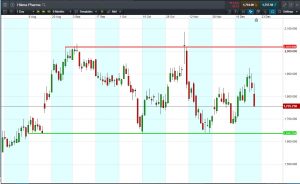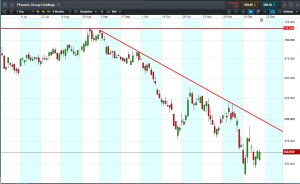This report is not a personal recommendation and does not take into account your personal circumstances or appetite for risk.
 My colleagues and I been discussing the UK Index reshuffle several times over the last couple of weeks, looking at potential outcomes of the latest quarterly changes to London’s blue-chip index. The dust seemingly settled on 4 Dec when the insurer Hiscox and engineering company Spirax-Sarco were promoted. At the same time, beleaguered postal service Royal Mail and takeaway platform Just Eat were relegated to .
My colleagues and I been discussing the UK Index reshuffle several times over the last couple of weeks, looking at potential outcomes of the latest quarterly changes to London’s blue-chip index. The dust seemingly settled on 4 Dec when the insurer Hiscox and engineering company Spirax-Sarco were promoted. At the same time, beleaguered postal service Royal Mail and takeaway platform Just Eat were relegated to .
Hiscox and Spirax-Sarco may have left their peers in the rear-view mirror 2 weeks ago. As the saying goes, however, “It ain’t over till it’s over”. Today (20 Dec), UK Index Russell announced that generic drugmaker Hikma will also join the UK 100 on 24 Dec. Shire’s acquisition by Japan’s Takeda means that Hikma will replace it. A generous index-rebalancing Christmas present from Santa.
 One pharma company out, another takes its place. Coincidence? It probably is, but let’s take a look at how Hikma managed to beat the odds and join the big boys club.
One pharma company out, another takes its place. Coincidence? It probably is, but let’s take a look at how Hikma managed to beat the odds and join the big boys club.
Curiously, if the UK Index reshuffle had taken place today, Hikma would have qualified for UK 100 promotion on merit: #90 by market cap on the , an auto-promotion threshold. Here’s how share prices moved since the 4 Dec reshuffle cut off date:
 Hiscox and Spirax-Sarco were promoted based on market cap, while Hikma will replace Shire as the next best name. If the reshuffle had taken place today, Hiscox and Hikma would be auto-promoted, while Spirax-Sarco would replace Shire as next biggest. Lots of fluctuations; exactly the same result.
Hiscox and Spirax-Sarco were promoted based on market cap, while Hikma will replace Shire as the next best name. If the reshuffle had taken place today, Hiscox and Hikma would be auto-promoted, while Spirax-Sarco would replace Shire as next biggest. Lots of fluctuations; exactly the same result.
Six of one, half-dozen of the other, you might say? Not for one stock we haven’t mentioned so far.
The biggest underachiever of the whole situation is actually insurance firm Phoenix. It was ahead of Hikma by market cap on 4 Dec (Phoenix: £4.34bn; Hikma: £4.26bn), but while Hikma rallied +4% in two weeks, Phoenix actually fell 6.8%, extending its 22% downtrend since late August.
Shares go up and down all the time and trading opportunities appear on the UK Index every day. Come the next UK Index reshuffle in March, will Hikma solidify its position in the blue-chip index? Will Phoenix Group shares maintain their downtrend (shares now just 4.5% away from 2018 lows), or will they reverse and challenge Hikma’s, Hiscox’s or Spirax-Sarco’s position in UK 100 ?
The battle to be a part of the UK Index can often produce attractive share price volatility. We regularly highlight these swings to our clients as part of daily trading opportunities. To get full access to all our market ideas, click here to subscribe to our Gold Pass trading opportunity package.
Artjom Hatsaturjants, Research Analyst, 20 December 2018
This research is produced by Accendo Markets Limited. Research produced and disseminated by Accendo Markets is classified as non-independent research, and is therefore a marketing communication. This investment research has not been prepared in accordance with legal requirements designed to promote its independence and it is not subject to the prohibition on dealing ahead of the dissemination of investment research. This research does not constitute a personal recommendation or offer to enter into a transaction or an investment, and is produced and distributed for information purposes only.
Accendo Markets considers opinions and information contained within the research to be valid when published, and gives no warranty as to the investments referred to in this material. The income from the investments referred to may go down as well as up, and investors may realise losses on investments. The past performance of a particular investment is not necessarily a guide to its future performance.
Prepared by Michael van Dulken, Head of ResearchComments are closed.